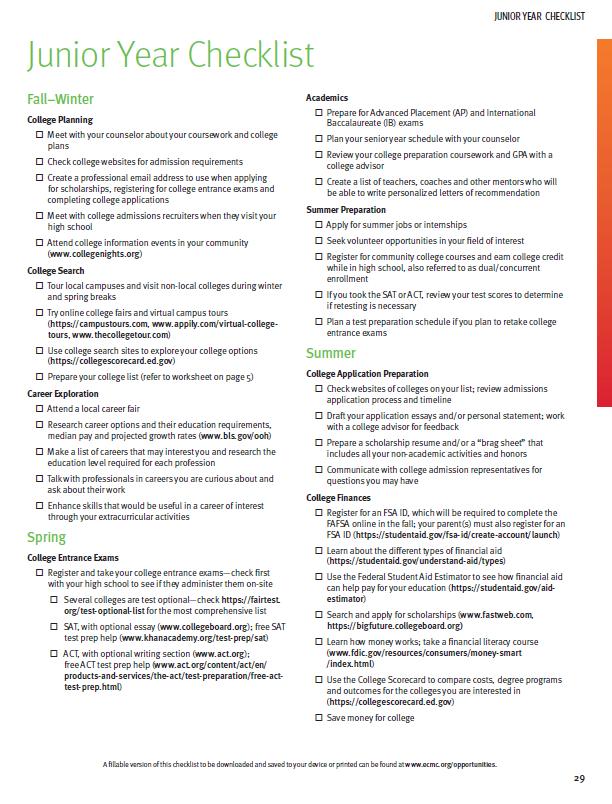


www.ecmc.org/opportunities







www.ecmc.org/opportunities














Why do you think education is important?













Note: Data are for persons aged 25 and over. Earnings are for full-time wage and salary workers.
Source: “2024 Current Population Survey.” U.S. Bureau of Labor Statistics. www.bls.gov/emp/chart-unemployment-earnings-education.htm.


Internship opportunities

Participating in research




Networking opportunities
Connect with peers from diverse cultures

Leadership in student organizations
Establish lifelong relationships










Community or Junior College

Four-Year College or University PAGE 4




Provides students with hands-on training while preparing for occupation Programs
• Concentrate on developing a specific skill
• Designed get students into the workforce quickly Credentials
• Certificate of completion
• Associate’s degree
• Industry Certifications
• Occupational Licenses


Offers programs that last up to two years that lead to a certificate or an associate degree

Programs
• Ideal for students seeking career training or a pathway to a bachelor’s degree
• Many schools have transfer agreements with state universities
Credentials
• Certificate of completion
• Associate’s degree
• Industry Certifications
• Occupational Licenses


Offers traditional academic programs; may offer technical, continuing education and remedial programs.
• Ideal for students seeking undergraduate and graduate degree programs
• Associate’s degree
• Bachelor's degree
• Master’s degree
• Doctorate



There are over
5,800
colleges in the U.S.


Identify your goals and interests

• Consider your academic strengths
• Identify careers that interest you
• Assessment: www.onetonline.org
• Explore career options and education requirements
• www.bls.gov/ooh




• Attend college fairs in your community
• Attend in-person or virtual college campus tour
• Discuss your options with guidance counselors and mentors
• Search online • www.collegeboard.org






School size






Class size



Support programs
Location


Learning formats
Extracurricular activities
Cost



Program of study: Are there programs/degrees that match your career goals?
School size: Do you prefer a large or small college? What is the student population?
Class size: How large do you like your classes to be? What is the student-to-teacher ratio?
Support programs: What is offered to help you stay in college and graduate?
City and neighborhood: Do you prefer a city or a small town?
Campus culture: When visiting each college, get a feel for its “personality.” How does it match yours?
Distance from home: How close do you want to live to your family?
Extracurricular activities: What other activities do you want/need access to?
Religious affiliation: Do you want to attend a college affiliated with your religious beliefs?
Net price: What will your final cost be after receiving grants and scholarships?
Financial aid options: Does the college have a tuition payment plan to spread out your payments or a guaranteed cost of attendance as long as you are enrolled?
Outside learning options: Does the college offer internships, externships, study abroad o service learning opportunities?
Housing options near campus: Will you need a car to get to school, work, shopping or back home, or is everything you need within walking or biking distance?
Other considerations



























Money that is given or lent to students in order to help pay for their education


Merit-based financial aid is awarded to students with specific talents or skills in areas such as academic achievements, athletics and performing arts.


Need-based financial aid is awarded to students who demonstrate financial need based on the information provided on their financial aid application, such as the Free Application for Federal Student Aid (FAFSA).





Grants are typically awarded by the federal government, state government or college and do not need to be paid back.


Scholarships are free money that does not need to be paid back. Funding can come from a variety of sources, such as your college, community organizations, employers and individuals.


Work-study is money earned while attending college and it does not need to be repaid. Students work part-time to earn money to help fund their college expenses.

Loans are borrowed money that must be paid back with interest. The most common loans are those offered through the Federal Direct Loan Program. Other loan options include private loans.
The first step to access federal, state, and institutional financial aid is to complete the Free Application for Federal Student Aid (FAFSA)
• Determines eligibilty for grants, loans, and work-study programs
• Completed high school senior year, and each year while attending college
• Opens October 1 annually
• The only way to know if you qualify for financial aid is to apply
• Complete the FAFSA www.studentaid.gov




• First launched on January 6, 2022 • Students who do not qualify for federal student aid but qualify for VA tuition equity (in-state tuition) • Provides access to VA state financial aid only • Application opens around the same time as the FAFSA • www.VASAapp.org







25



Summary from a college that outlines the types of financial support a student is eligible to receive to help pay for their education.
• Includes grants, scholarships, work-study, and loans
• Includes net price (what you pay for college after financial aid is subtracted)
• Students receive their aid offer from the college after they have been accepted and completed their financial aid application.
• Compare offers from different colleges


How many scholarships are awarded each year in the U.S.?

Approximately 1.7 million scholarships are awarded each year.


Scholarships are free money for college that do not require repayment.
Local scholarships
• High School
• Employer

• Community
• Colleges
Regional Scholarships
• City
• District
National/Worldwide
• Scholarship platforms
• County
• State
• Online PAGE 20


This scholarship is guaranteed or your money back.





You can’t get this information anywhere else.




We’ll do all the work for you. The scholarship will cost some money.


May I have your credit card or bank account number to hold this scholarship?





You're a finalist [for a contest you never entered].








Start searching today

Search everywhere, starting locally




Explore scholarship platforms
Get familiar with application requirements

You can’t win if you don’t apply.
Watch out for scams



Complete online assessment to help identify goals

Finish “Choosing the Right College for You” worksheet




Attend college tours (virtual or in person)
Experiment with net price calculators

Have a family financial aid discussion
Apply for scholarships









